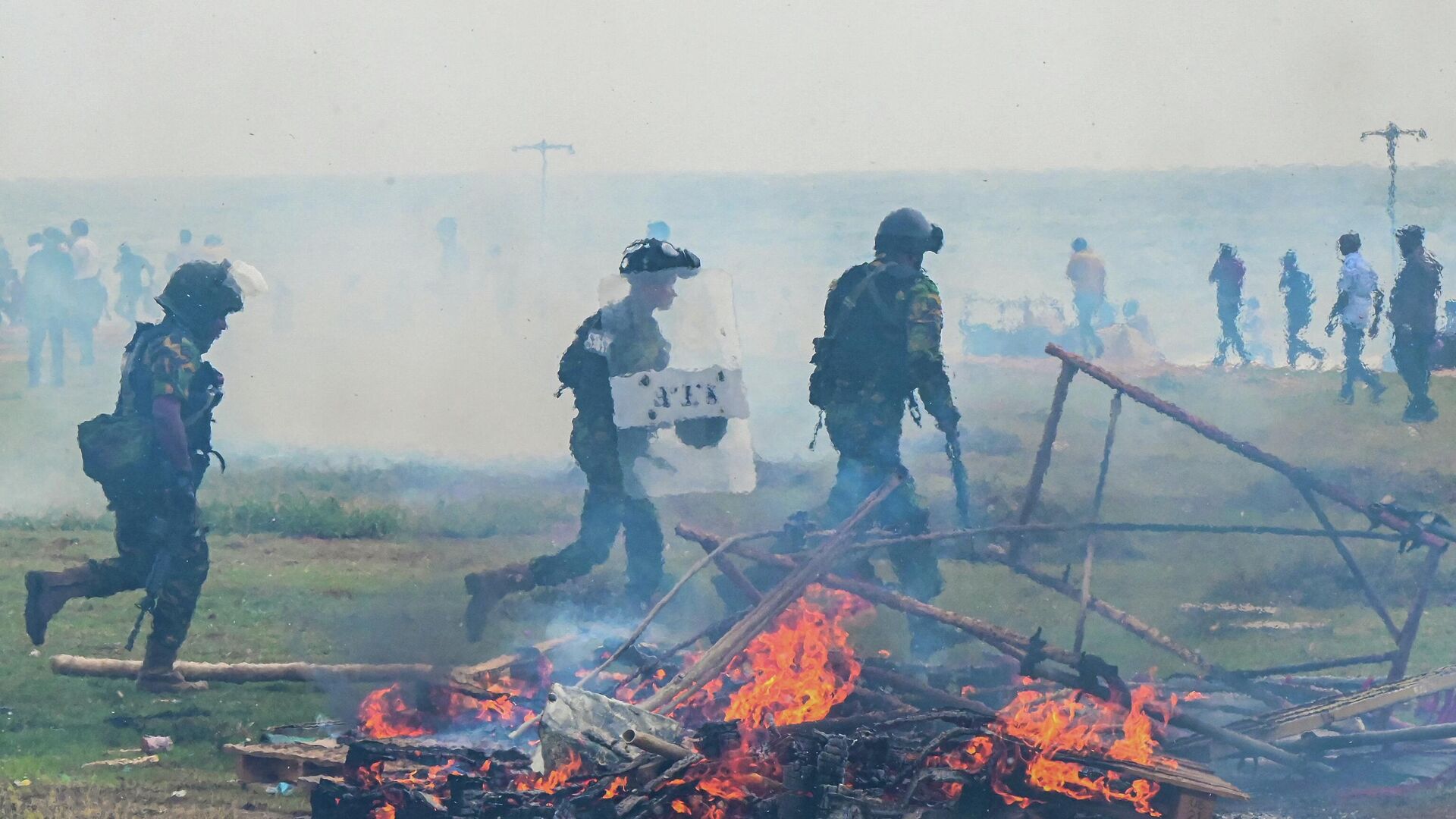US Pressures Sri Lanka to Curb Powers of President to 'Safeguard Democracy'
12:25 GMT 29.05.2022 (Updated: 18:35 GMT 19.10.2022)

© AFP 2023 / ISHARA S. KODIKARA
Subscribe
The US, UK as well as India have been urging Colombo to devolve the powers of the executive presidency, a concern shared by domestic political groups such as Tamil National Alliance and SJB. Fulfilling the political demand is seen as a key for Sri Lanka to avail an economic relief package from western governments and institutions such as IMF.
The US Ambassador to Sri Lanka Julie Chung met the country’s foreign minister GL Peiris to discuss the political and economic situation in the South Asian nation on 27 May. The proposed 21st amendment to the Sri Lankan Constitution was discussed during the talks.
As per a Sri Lankan foreign ministry release on Sunday, Peiris assured the American diplomat that the 21st Amendment to the Constitution was currently being “studied” by the nation's political parties.
“He (Peiris) said that despite the current economic challenges, the government was determined to make progress in addressing post-conflict reconciliation-related issues,” the Sri Lankan foreign ministry release stated.
Predominantly Sinhalese Buddhist Sri Lanka faced a 26-year violent insurgency between 1983 and 2009 led by the banned terrorist group Liberation Tigers of Tamil Eelam (LTTE). The LTTE’s aim was to create a separate Tamil state consisting of the northern and eastern parts of Sri Lanka. Thousands of civilians, mostly Tamils, were killed in the final stages of the insurgency in collateral damage as the Sri Lankan forces moved into the insurgency-ravaged areas to take out the LTTE leadership.
The insurgency was fuelled by several bouts of ethnically-motivated violence targeting Sri Lankan Tamils in the 1970s and 1980s. It was during the initial years of the insurgency in the 1980s that a formula for power-sharing based on the greater devolution of power to the predominantly Tamil northern and eastern parts of the country was first suggested. However, such an arrangement has yet to be implemented at the ground-level.
The American Ambassador also met Sri Lankan Parliamentary speaker Mahinda Yapa Abeywardena on 27 May, as per the Department of Communications on 27 May.
In the meeting, Chung said she “emphasised the need to carry out the political reforms desired by the people and to safeguard democracy in the country”, the official release stated.
The issue of enacting the 21st Amendment also figured in discussions between the British High Commissioner to Colombo Sarah Hulton and the Sri Lankan foreign minister on 26 May, as per an official release.
India has also advised Sri Lanka to devolve powers from the executive presidency, a provision which was also part of the India-Sri Lanka Accords in 1987.
The 21st Amendment to the Sri Lankan Constitution mulls placing checks and balances on the executive presidency by reversing the 20th Amendment, passed in October 2020 after former Prime Minister Mahinda Rajapaksa’s Sri Lanka Podujana Peramuna (SLPP) stormed to power in a landslide election victory.
The 20th amendment empowers the President to dissolve the parliament within two and a half years after being elected to office. Under the constitutional amendment, the President could appoint any person in the government without any prior consent from members of parliament (MPs).
It also affords powers to the President to hold any ministry he desires and fire ministers without any due consultation with the Parliament.
The changes in the 20th Amendment reversed the checks and balances imposed on the executive presidency through the 19th Amendment, passed in 2015.
Restricting the power of the President is also a key demand of the protesters who have been demonstrating in Colombo and Galle over the country’s crippling economic instability and shortages of food, fuel, and other essentials owing to depleting forex reserves.
Mahinda Rajapaksa resigned from his position as prime minister on 9 May following a spate of deadly violence across the nation.
The new Prime Minister, Ranil Wickremesinghe introduced the 21st draft amendment at a cabinet meeting on 23 May, just days after he assumed the position.
‘Final Meeting’ on 21st Amendment on 3 June, Says PM
Wickremesinghe convened a meeting of the major political parties in Sri Lanka on Friday (27 May) to discuss the 21st Amendment, as per a series of tweets by the PM.
The Prime Minister said that a “general consensus” on the need to amend and pass a 21st Amendment to the constitution had been reached during Friday’s meeting.
However, on Sunday, the Samagi Jana Balawegaya (SJB), which is the second biggest party in the Sri Lankan parliament, called for “further revisions” to the draft of the 21st Amendment before the meeting on 3 June.
As per local media reports, the SJB has demanded a new clause wherein the President would be elected by the MPs.
SJB General Secretary Ranjith Madduma Bandara has also called upon the government to table the final amendment in the Parliament for ratification before it comes into effect.



